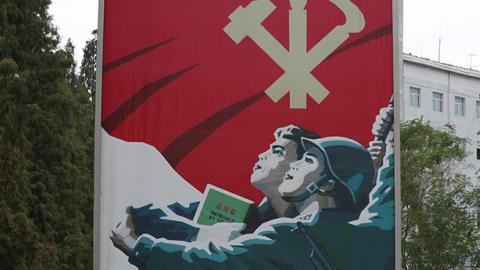Last Thursday Otto Warmbier was buried. He was 22, a promising young man at the beginning of what would have been a long and productive life surrounded by a loving family and friends. The North Korean government seized him while he was with a group of other student visitors, charged him with stealing propaganda, imprisoned him, and then caused his death by torture.
If the Trump administration allows his murder to go unanswered by a punishing response, other hostages are likely to suffer similar fates, in North Korea or wherever and whenever Americans are taken prisoner. As President Trump must surely know, the North Koreans returned the young man because they realized that the torture they had inflicted on him was about to result in their hostage’s death. That Pyongyang did not want the appearance of blood on their hands shows that they worry about America’s reactions to such unprovoked savagery.
The Trump administration should seek to make the North Koreans worry more. President Trump tweeted that “what happened to Otto…should never be allowed to happen.” He is right.
Standard operating procedure in a hostage situation is to negotiate but to use force if the terrorists begin to kill their victims. North Korea’s murder of Otto Warmbier shows that the Pyongyang government is willing to kill its hostages. President Trump appears very much to mean what he says: this should not happen again. To make certain, the Trump administration needs to act effectively, forcefully, and swiftly. It should start by reversing the mistakes of its predecessors.
The George W. Bush administration removed North Korea from the U.S.’s list of state sponsors of terrorism in 2008. The objective was to encourage North Korea to walk back from their nuclear weapons program. This was like closing the barn door after the horses had escaped their stalls. North Korea had already tested its first nuclear device in 2006.
Moreover, North Korea is a long-time state sponsor of terror. Its agents planted a bomb aboard a South Korean passenger flight en route Seoul from Baghdad in 1987. The bomb exploded killing all 115 people aboard. In February of this year, Kim Jong Nam, the older son of former North Korean ruler Kim Jong Il was murdered in the Kuala Lumpur airport. Kim was the half-brother of the current North Korean tyrant, Kim Jong Un. Kim has a taste for killing relatives whose company he prefers to avoid. The Trump administration should begin its response to Otto Warmbier’s murder by restoring North Korea to its correct place on the State Department’s list of state sponsors of terrorism. Call a spade a spade.
The Obama administration’s stated policy of “strategic patience” toward North Korea should be abandoned. “Strategic impatience” would be a better guide for actions that the U.S. takes in response to Otto’s murder. North Korea’s nuclear weapons program is advancing in tandem with its ballistic missile development. The end state is certain: powerful nuclear weapons than can be placed aboard missiles with intercontinental range.
President Trump was pleased by his April meeting with Chinese President Xi Jinping and seemed to be persuaded that the Chinese leader would take effective action to rein in North Korea. There is little to show besides a slight uptick in Chinese rhetoric aimed at North Korea. Trump evidently understands this. On 20 June, he tweeted that “while I greatly appreciate the efforts of President Xi & China to help with North Korea, it has not worked out.” President Trump has a point: North Korea has tested six missiles—of which five were ballistic missiles—since his early April meeting with the Chinese leader. Xi’s assurances have come to naught.
Effective Chinese action against North Korea would stop or greatly restrict China’s trade with North Korea, the major source of hard currency for Pyongyang’s straitened economy. Progress with China on the host of trade, financial, security, and diplomatic issue between Washington and Beijing should be based on China’s ability effectively to cut off the access that North Korea possesses to foreign currency through its trade with China.
The U.S. can turn up the heat on China if it fails to punish North Korea. And it should. China has participated in two previous U.S.-led Pacific naval exercises. The invitation can be withdrawn. The U.S. can pressure many of the world’s nations to recognize Taiwan. It can impose sanctions on Chinese firms that assist North Korea’s missile and nuclear programs.
The Trump administration should also ban Americans from traveling to North Korea. There is no point in allowing innocent people to put themselves in places where they can be kidnapped, tried in kangaroo courts, and tortured to death. This may disappoint Dennis Rodman, but there is no lack of other psychopathic rulers to visit around the world. Mr. Rodman might even prefer the hospitality of Abu Bakr al-Baghdadi, ruler of ISIS.
Finally, the U.S. should send a strong signal to North Korea that there is a stiff price to be paid for taking innocent Americans’ lives. The sinking of one or two North Korean patrol vessels would be such a message.
The U.S. does not seek a return to hostilities on the Korean Peninsula. But with each new missile and nuclear device test, and with each new demonstration of savage intent, Pyongyang increases the chances for a resumption of hostilities. Better to deter than be forced into a fight. A punishing response would deter where negotiations merely raise additional questions about our will. Strong action would also be an appropriate response to North Korea’s murder of an innocent American.















